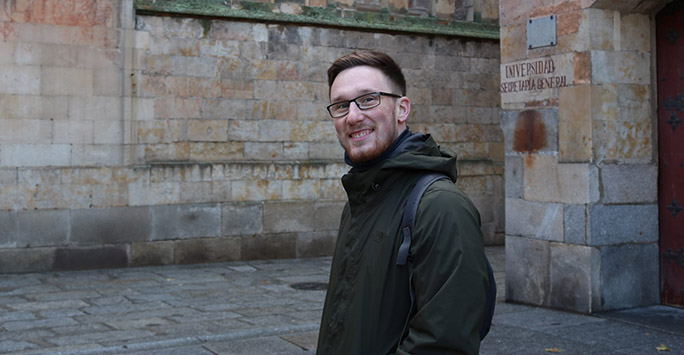
Student Spotlights pass the mic to our student doctors, to hear their take on their School experience and shine the light on a particular role, team or pathway through the School of Medicine. This month, Year 2 Student Doctor Jed Winstanley shares his story.
You are part of the School’s Graduate Entry programme, the four year MBChB pathway to train as a doctor. What did you study before joining us?
I completed a degree in Biological Sciences at Lancaster University and my Masters in Psychology (Conversion) at Edge Hill University.
What made you decide to become a doctor?
Whilst on my MSc I became a Psychiatric Healthcare Assistant to gain experience working within a range of NHS mental health services such as psychiatric intensive care, acute adult, CAMHS (Child and Adolescent Mental Health Services) and later life and memory services. I had numerous opportunities to meet individuals admitted to the wards, often during a mental health crisis, that went on to recover a much higher quality of life.
Regularly witnessing transformations like this never failed to astound me and inspired me to apply to study medicine.
I’d really like to dedicate the rest of my life to improving the quality of life for people in this way as a doctor and, ultimately, a Consultant Psychiatrist.
 Jed climbing Mount Snowdon, Wales
Jed climbing Mount Snowdon, Wales
Thinking back to your first day on each course - what felt the same and what felt different?
On my first day at Lancaster University, I remember sitting in an enormous lecture theatre with 200+ other students whilst a line of staff from the Biomedical and Life Sciences department took turns introducing themselves and describing their areas of expertise.
On my first day at Liverpool [during the pandemic] I woke up, walked five steps, switched on my laptop and joined my first ever online Zoom meeting – all from the comfort of my own home. The diverse mixture of feelings was very similar for both of my first days: excitement, first day nerves, happiness, and the fear of the unknown.
What skills from your first degree have you applied to your MBChB studies?
Throughout my previous studies I developed a good level of self-awareness when it comes to balancing university work with my mental and physical wellbeing. I now know what to look out for in myself when I am on my way to feeling burnt out, and nip it in the bud. For example, a dwindling concentration level tends to be one of the first red flags for me.
Our body can be very good at letting us know when it needs a bit of time to recuperate but it can be difficult to permit this when there is so much to be done.
Having the ability to acknowledge when my body, particularly my brain, needs a break from studying and enabling it to do so guilt-free has proven useful.
How has your journey on the Graduate Entry Programme been so far?
I have been awestruck by how eager student doctors are to help each other out, irrespective of the stage they’re at in training. Whenever I log into my social media I am inundated with events put on by other students aiming to impart their knowledge, experience and stimulate interest in various medical specialties.
A challenge I’ve faced has been trying to gauge the breadth and depth of knowledge required to learn and eventually practice medicine. During my Biological Sciences degree we would spend an entire lecture diving into, just to give an example, the precise cellular mechanism of glycolysis and each of the steps involved. Whereas in medicine, it seems having an awareness of the process and how it fits into the overall picture of blood glucose homeostasis is what's important.
 Jed partaking in a charity skydive for mental health awareness
Jed partaking in a charity skydive for mental health awareness
What advice would you give to incoming Grad Entry students?
It goes without saying that medicine is a ridiculously competitive field to go into and, speaking from personal experience, that Imposter Syndrome isn’t going away anytime soon! However, I’d like to encourage you to stop whatever you are currently doing, congratulate yourself and remind yourself that you have made it this far.
You have earned your place here. You deserve to be here. Don’t let your brain tell you otherwise.
Medicine is renowned for being a lifelong journey of learning, growth and development so it can be easy to get wrapped up in continually thinking ahead and how far there is still to go. Taking a step back and gently reminding yourself why you applied to study in the first place can ease any uncomfortable feelings.
My personal approach is to take things one day at a time and focus on the here and now.
Do you want to step into the spotlight?
If you would like to feature in the spotlight series, or nominate someone to share their story, drop us a line at mednews@liverpool.ac.uk.